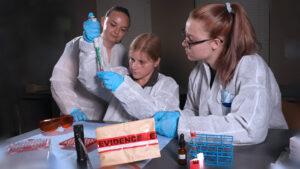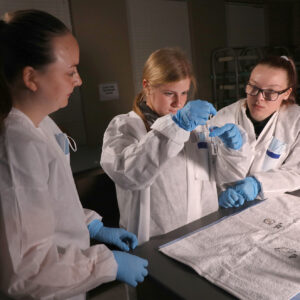
Forensic Science, BS
If you’re looking for excitement and challenge in a career that benefits society, earning a Bachelor of Science in Forensic Science from Hilbert College can be the first step.
Our four-year forensic science degree in laboratory sciences program prepares you for success with a strong foundation of knowledge in the natural/physical sciences and the laboratory analysis of evidence that is admissible in courts of law. You will receive the most current technological training in the biological sciences—specifically, forensic DNA analysis methods and interpretation—with an emphasis on chain of custody, legal precedents, sociology of crime and expert witness testimony as they relate to the analysis of physical evidence.
What Can You Do With a Forensic Science Degree in Laboratory Sciences?
 Hilbert’s forensic science degree can be the credential you need to get your start in a broad range of careers in the fields of law enforcement, crime, intelligence and even technology. Foundational concepts in biology and chemistry will prepare you for specialized forensic knowledge in areas such as toxicology and DNA analysis. You will learn about the legal system, the laws and rules of evidence, and criminal justice ethics. Best of all, you will open a door to personal and professional satisfaction in roles that allow you to make a meaningful difference in the communities you serve.
Hilbert’s forensic science degree can be the credential you need to get your start in a broad range of careers in the fields of law enforcement, crime, intelligence and even technology. Foundational concepts in biology and chemistry will prepare you for specialized forensic knowledge in areas such as toxicology and DNA analysis. You will learn about the legal system, the laws and rules of evidence, and criminal justice ethics. Best of all, you will open a door to personal and professional satisfaction in roles that allow you to make a meaningful difference in the communities you serve.
A bachelor’s degree in forensic science can also serve as the foundation for advanced study leading to a graduate (master’s, doctoral, or MD) degree, opening up even more opportunities to advance to senior leadership positions, such as Forensic Biologist, Medical Examiner as well as teaching and research faculty positions in colleges and universities.
Benefits of a Bachelor’s Degree in Forensic Science
If you are wondering if a forensic science degree in laboratory sciences is worth it, the answer for many is an emphatic yes. Here are just a few of the benefits of earning a Forensic Science: Laboratory Sciences degree:
- Job security. Forensic scientists play a critical role in public safety. Their specialized skills and knowledge enable law enforcement to effectively investigate and solve crimes and assist the legal system in prosecuting perpetrators. These specialized skills make forensic scientists valuable to employers at every level—federal, state and local.
- Exciting Career Path Opportunities. The field of forensic science offers a variety of specialized role – Hilbert’s program focuses on equipping you for careers centered around the legal analysis of biological evidence:
- Forensic Biology/DNA Analyst: Analyze DNA, body fluids, and other biological materials from crime scenes. Your work will build a strong scientific foundation for linking suspects to crimes and presenting expert witness testimony in court.
- Forensic Toxicology: Examine bodily fluids and tissues to determine the presence and effects of drugs and poisons. Your findings can play a critical role in investigations, helping to determine cause of death or impairment, and may be presented as evidence in court.
- Forensic Chemist: Some opportunities may offer exposure to analyzing non-biological trace evidence (hairs, fibers) for chemical composition. This broader understanding can be valuable in the context of a holistic forensic science career.
- Career advancement. Forensic scientists enjoy many opportunities for career advancement. Beyond simply moving up to senior roles within their initial careers, forensic science professionals may choose to specialize in an area such as laboratory work or DNA preservation or pursue advanced degrees that can allow them to teach others about the trade.
Why Choose Hilbert for Your BS in Forensic Science: Laboratory Sciences Degree?
Hilbert’s forensic science degree program is distinguished by the experience and expertise of our faculty, many of whom have worked in criminal justice for 25 years or more and have earned advanced degrees. Our professors have worked as special agents, detectives and forensic investigators and come from the ranks of the FBI, New York State Police, county sheriff’s departments, local police departments and the Erie County Medical Examiner’s Office.
But our expert faculty is only the start. Hilbert also offers you:

- Small class sizes that guarantee you face time with your professors and full immersion in a culture of giving back to communities through service learning
- A program that is rooted in laboratory sciences and fulfills the requirements for pre-medical, pre-dental, pre-pharmacy, pre-veterinary programs and more
- A state-of-the-art science laboratory with spacious benches for lab work, chemical hoods with efficient ventilation systems, cabinetry, glassware, computer software and the proper instrumentation needed to conduct scientific research projects
- More than 400 classroom hours of hands-on training and laboratory practice
- Exciting internship opportunities with forensic labs and law enforcement agencies—which commonly lead to job offers for our graduates
- Academic skills workshops, one-on-one tutoring, learning strategies instruction and academic counseling to help you perform at your best
- A dedicated Office of Career Development providing resources, knowledge and strategies to help you achieve your career potential
- More than 25 student organizations, clubs and honor societies, plus intramural and club sports
Specialize Your Forensic Science Degree With Pre-Professional Programs
Thinking of pursuing admission to a professional school after earning your bachelor’s degree? Our Pre-Health Professional Programs in pre-med, pre-dental, pre-pharmacy and pre-veterinary tracks can help you fulfill your pre-professional requirements. The curriculum of our Forensic Science: Laboratory Sciences degree complements most of the course requirements for these tracks.
Bachelor’s Degree in Forensic Science: Laboratory Sciences Careers
A bachelor’s degree in forensic science can open the door to a variety of career opportunities, including:
- DNA Analysis, Serology, or Forensic Biology Technician in public and private forensic/crime labs.
- Entry-level Laboratory Assistant/Technician in forensic biology labs, pharmaceutical and biotech industries.
- Research Assistant/Technician in research labs in universities/medical schools and government agencies such as National Institutes of Health (NIH), US Food and Drug Administration (FDA), etc.
- Pharmacy Assistant/Technician in pharmacy or drug stores.
Additional studies at the graduate level can open up even more pathways to senior positions—and higher salaries.
What Is the Typical Salary for BS in Forensic Science: Laboratory Sciences Degree Graduates?
The forensic science degree program at Hilbert College can help you build a foundation to pursue any of a number of careers in the field. Following are median salaries for some of those roles:
Median Annual Salary: $54,526**
Median Annual Salary: $100,590**
Median Annual Salary: $67,440*
Median Annual Salary: $89,000**
Median Annual Salary: $81,680*
*2024 Salary, growth and job numbers info based on data compiled by the U.S. Bureau of Labor Statistics
**2024 Salary info based on data compiled by Payscale
Bachelor’s Degree in Forensic Science: Laboratory Sciences Job Outlook
The job outlook for forensic science degree holders is positive. The U.S. Bureau of Labor Statistics projects employment of forensic scientists to grow 14% between 2023 and 2033, much faster than the average for all occupations (5%). Drivers of this growth include additional hiring of forensic science technicians by state and local governments to process their high caseloads, as well as scientific and technological advances that are expected to increase the availability and reliability of objective forensic information used as evidence in trials.
In addition, U.S. News & World Report ranks “forensic science technician” at #5 on its list of Best Science Jobs for 2022 owing to its high earning potential (largely dependent on geographic location), the diverse array of career possibilities available in forensic science and the relatively low stress level reported by forensic science technicians in the field today.
Bachelor’s Degree in Forensic Science: Laboratory Sciences Curriculum
The Forensic Science: Laboratory Sciences degree curriculum offers an interdisciplinary course of study that focuses on the development of critical skills and knowledge for analysis of evidence and its use in the criminal justice system. Coursework includes biology, chemistry, physics, statistics, cell and molecular biology, population genetics, laws and rules of evidence, and moot court. This background promotes a stronger, more precise relationship between the scientific lab responsible for analysis of evidence and its relation to the criminal justice system through reliable, objective forensic DNA information used as evidence at trials. All of this coursework is embedded within a well-balanced liberal arts–based scientific bachelor’s degree that includes more than 400 hours of hands-on training and laboratory practice
Frequently Asked Questions
Graduates of Hilbert’s Forensic Science: Laboratory Sciences degree program may pursue any of a variety of rewarding careers, each offering competitive salaries and growth potential.
- As a Forensic Biologist or DNA Analyst, you’ll analyze DNA, body fluids, and other biological evidence from crime scenes. Your work helps link suspects to crimes, exonerate the innocent, and prepare you for expert witness testimony in court. You’ll translate complex scientific findings into clear and concise explanations for legal proceedings.
- Forensic Toxicologists examine bodily fluids and tissues to determine the presence and effects of drugs and poisons. These findings can be crucial in investigations, helping determine cause of death or impairment, and may be presented as evidence in court.
The median annual salary for professionals holding a bachelor’s degree in forensic science from a U.S. higher education institution was about $63,000 as of January 2023, according to Payscale.
Most students complete our Forensic Science: Laboratory Sciences degree program in four years or less. Full-time students with eligible transfer credits may be able to complete the program sooner. In addition, Hilbert offers the innovative combined bachelor’s/master’s program, a “4+1” plan that lets students earn a bachelor’s degree in forensic science: laboratory sciences or a forensic science: crime scene investigation degree and a master’s in criminal justice administration in five years.
Our Forensic science: Laboratory Sciences degree comes with many benefits, from job security and the opportunity to do meaningful work to diverse career paths and opportunities for career advancement. The specialized skills and knowledge you will gain on your way to becoming a forensic scientist will make you an invaluable resource to law enforcement and the criminal justice system as you apply your curious mind and love of science to the protection and good of society.
Contact Us
-
Dr. Habibul Bakht
Chair, Division of Natural and Behavior SciencesAssociate Professor

